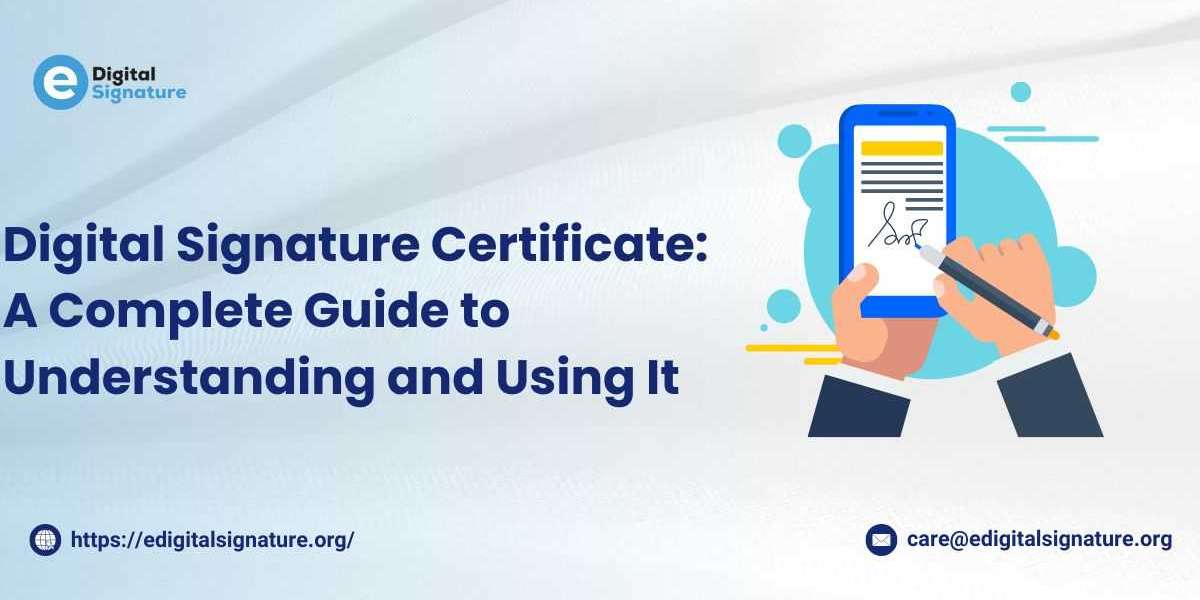In today’s digital world, the importance of secure and reliable online transactions cannot be overstated. Whether you’re conducting business, signing important documents, or filing taxes online, the need for secure authentication has become paramount. This is where the Digital Signature Certificate (DSC) comes into play.
A Digital Signature Certificate serves as a digital equivalent of a traditional handwritten signature or a stamped seal, providing security, integrity, and authenticity to electronic documents. This guide will delve into the concept of DSC, its various types, how it works, and why it’s becoming a necessity for both individuals and businesses in the digital age.
What is a Digital Signature Certificate (DSC)?
A Digital Signature Certificate (DSC) is an electronic form of a signature that is used to authenticate the identity of the sender of an electronic document. It’s issued by a Certifying Authority (CA), which is a trusted organization that validates the identity of the certificate holder before issuing a digital certificate.
Just like a handwritten signature on a paper document, a DSC proves that the sender is who they claims to be. Additionally, it ensures that the content of the document has not been tampered with after it was signed, providing both authentication and integrity.
A DSC uses Public Key Infrastructure (PKI) technology, which ensures that the digital signature is unique to the person signing and is associated only with the signed document.
How Does a Digital Signature Certificate Work?
To understand how a Digital Signature Certificate works, it’s essential to grasp the underlying technology – Public Key Infrastructure (PKI). PKI is based on the concept of two keys: a private key and a public key.
- Private Key: This is a secret key that the signatory keeps safe. It is used to create a unique signature on a document.
- Public Key: This key is shared openly with others. It is used to verify the authenticity of the signature and ensure that the document hasn’t been altered.
When someone signs a document electronically using a DSC, their private key encrypts the document or message. The recipient, using the sender’s public key, can decrypt the message, confirming the sender's identity and verifying that the document has not been tampered with.
Types of Digital Signature Certificates
There are several types of Digital Signature Certificates, each serving different purposes. The Certifying Authorities (CA) offer these certificates based on the security level required and the type of transaction.
Class 1 Digital Signature Certificate (DSC):
- Usage: These are typically issued for individuals and are used for low-security purposes, like securing emails.
- Verification: Class 1 certificates validate that the email address of the individual is legitimate and not fake.
- Target Audience: Used for personal applications, email communication, and minor online verifications.
Class 2 Digital Signature Certificate:
- Usage: These certificates are used for higher-level applications and are commonly used in income tax filings, company registration, and e-filing.
- Verification: Class 2 certificates verify the identity of the individual against a trusted list of registered individuals.
- Target Audience: Businesses, professionals, and individuals engaging in e-commerce or online business transactions.
Class 3 Digital Signature Certificate:
- Usage: These are used for high-security applications and are often required for e-auctions, online tenders, and corporate transactions.
- Verification: Class 3 certificates are issued after a face-to-face verification of the applicant’s identity. They offer the highest level of security for online transactions.
- Target Audience: Enterprises, government departments, and organizations conducting high-stakes or high-value online transactions.
Digital Signature Certificates for E-Tendering:
- Usage: These certificates are specifically designed for participating in e-tendering and e-auction processes.
- Verification: These certificates help authenticate bidders and validate the bid documents submitted electronically.
- Target Audience: Companies involved in government tenders and businesses in sectors like construction and procurement.
Benefits of Using a Digital Signature Certificate
The implementation of DSCs brings with it a variety of benefits. Here are some of the most important advantages:
- Enhanced Security: The private key is known only to the signatory, ensuring that no one else can forge the signature. The document can also be encrypted, preventing unauthorized access.
- Time Savings: Digital signatures can speed up the document signing process by eliminating the need for physical signatures, making transactions faster and more efficient.
- Cost-Effective: With DSC, you can sign documents without needing paper or ink, leading to cost savings on printing, courier services, and postage.
- Legal Validity: In many countries, DSCs have the same legal validity as physical signatures. This is particularly important in the context of online contracts, business transactions, and tax filings.
- Audit Trail: A DSC ensures that an audit trail is created, providing proof of who signed a document, when it was signed, and whether the document has been altered since it was signed.
- Environmental Benefits: By reducing the need for paper and ink, DSCs contribute to a more eco-friendly business process.
- Authenticity and Integrity: It helps in verifying both the authenticity of the signer and the integrity of the document, ensuring no unauthorized changes have been made.
How to Obtain a Digital Signature Certificate?
Getting a Digital Signature Certificate involves several steps. The process may vary slightly depending on your country, but the general steps are as follows:
Step 1: Visit Our Website
Go to our website to start the process.
Step 2: Fill in Your Details
- User Type: Choose if you are an individual or an organization.
- Certificate Type: Pick if you need it just for signing documents or for both signing and encryption.
- Validity: Choose how long you want the certificate to last.
- Personal Info: Enter your name, phone number, email, and address.
- Agree to Terms: Check the box to agree to the terms.
- Submit: Click the submit button.
Step 3: Choose Token Option
- Already Have a Token?: If you have a USB token, choose "No." If you need a new one, choose "Yes."
Step 4: Make Payment
- Payment: Enter your payment details and choose how you want to pay (net banking, credit card, debit card, or UPI).
Step 5: Complete the Process
- Review: Make sure all your information is correct.
- Submit: Click submit and wait for a confirmation email.
Step 6: Get Your Digital Signature
You’ll receive your digital signature on a USB token drive after processing.
Uses of Digital Signature Certificate
A Digital Signature Certificate can be used in various domains. Some of the most common uses are:
- E-Government Services: DSCs are used for online tax filings, business registrations, and to access government services that require secure online identification.
- E-Contracts and Agreements: Digital signatures are increasingly used for signing contracts and agreements electronically, making transactions faster and legally valid.
- Online Banking: Many banks use DSCs for secure online banking transactions and to verify the authenticity of requests.
- Digital Documents: DSCs ensure that digital documents such as PDFs, Word files, or Excel sheets cannot be altered after signing.
- E-Tendering: In e-tendering processes, DSCs ensure that the documents submitted are authentic, and no changes are made to the tender after submission.
- Compliance and Audit: DSCs ensure that all documents are compliant with the legal framework and can be used for auditing purposes.
Suggested read:- Digital Signature Certificate for Income Tax
Conclusion
A Digital Signature Certificate is an essential tool for securing online transactions, ensuring authenticity, and protecting the integrity of documents in the digital world. Whether you are an individual signing contracts, a business filing taxes, or an enterprise dealing with high-value tenders, DSCs offer a secure and efficient way to authenticate your identity and ensure that documents are tamper-proof.
As the digital landscape continues to grow, adopting Digital Signature Certificates will become increasingly important for anyone who wishes to engage in secure online activities. The benefits of DSCs, including legal validity, cost savings, and environmental sustainability, make them a must-have in today’s fast-paced digital environment.



